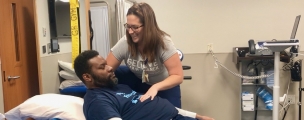With football season nearing full speed, the media’s attention will once again focus on the well publicized risks of sports related concussions. No matter what you choose to call it: a blow to the head, a brain bruise, a head bump; clinically, there is no question what a concussion really is: a traumatic brain injury (TBI).
Often categorized, as a “mild” traumatic brain injury due to the fact that they are mostly non-life threatening, a concussion should garner no less attention than more severe forms of brain injury in the long term.
A concussion, as described by the CDC, is a brain injury “caused by a bump, blow, or jolt to the head or by a hit to the body that causes the head and brain to move rapidly back and forth.” The result of this quick and often unexpected force is the stretching and damaging of brain cells from the brain bouncing back and forth or twisting inside the skull. Watch the CDC’s Animation of a Concussion video here.
Although sports are certainly one common cause of concussions, it’s important to note that concussions can also be the result of motor vehicle accidents, falls, and unfortunate trauma to the head due to violence, abuse, and blast injuries such as in warfare. At the the Philadelphia Concussion Center at Magee, individuals are seen for diagnosis and treatment of concussion from numerous different causes.
So you’re not an NFL player or a world class boxer? With a flood of information available from many sources, it can be difficult to figure out what the average person should pay attention to. Below are some of the most basic, yet important facts about concussion that we think everyone should be aware of, along with some of the hard truths about a concussion diagnosis.
Simple facts:
-A concussion can happen to anyone from infants to 90 year old individuals.
-A concussion is a traumatic brain injury.
-Falls, motor vehicle accidents, being struck or hit hard on the head, and assault are the leading causes of non-fatal traumatic brain injuries (Source: CDC).
-During a concussion from any cause, there is damage to brain cells that can create chemical changes in the brain causing a variety of symptoms.
-Symptoms of a concussion vary greatly between individuals, but can include some or all of the following:
Headaches
Visual disturbances
Difficulties with memory
Difficulty paying attention and concentrating
Trouble sleeping and unusual fatigue
Dizziness or balance issues
Irritability
Hard truths:
-Symptoms of concussion may not show up immediately post injury.
-Concussions can go undiagnosed because of delayed symptoms or focus on ruling out more immediate life threatening injuries such as following a motor vehicle accident or fall.
-Concussions can have permanent long term effects if proper care is not taken following injury.
-All cases of concussion or possible concussion should be taken seriously, and medical attention should be sought as soon as one is suspected.
Watch for future posts in this series on the importance of baseline testing, questions you should ask your physician, and concussion recovery.
For more information, or to schedule an appointment at the Philadelphia Concussion Center at Magee call 855-587-BRAIN (855-587-2724).







